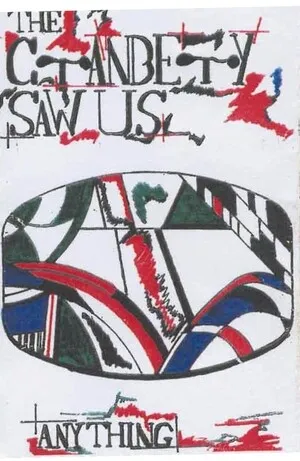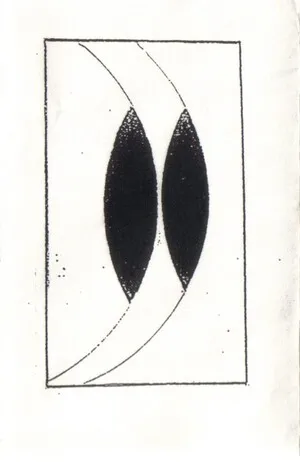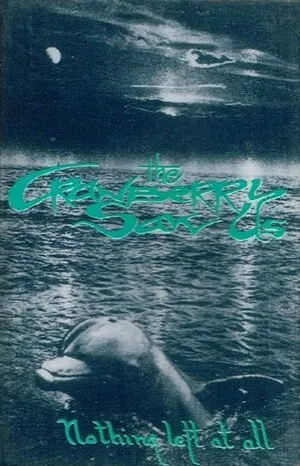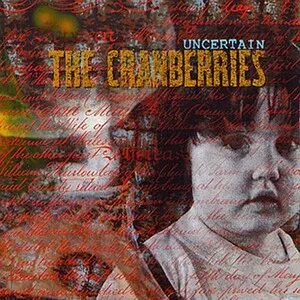The Cranberries early demo EP's
Another month, another rock star gone too soon: Dolores O'Riordan, the singer and principal creative force for the Irish band Cranberries, died suddenly this past week at the age of 46. The Cranberries achieved major global success during the alternative rock boom of the '90's. Distinguished by O'Riordan's captivating voice, the band has sold over 40 million records worldwide over the course of their career. The band's official debut was the 1993 album Everybody Else Is Doing It, So Why Can't We?, but the band was originally formed in 1989 in Limerick, under the name The Cranberry Saw Us. (Cranberry sauce, get it?). Before their debut album, the band recorded four demo EP's, which were sold in Ireland in limited numbers in 1990 and 1991. The first three, billed to The Cranberry Saw Us, were only distributed as cassettes; the fourth, Uncertain, was distributed on vinyl and on CD, and was the first recording billed to the shortened Cranberries name.
In the beginning, the band had a male singer named Niall Quinn, as well as its constant members Noel Hogan (guitar), Mike Hogan (bass), and Fergal Lawler (drums). On their first self-released EP titled Anything, the original quartet were billed as a misspelled The Cranbery Saw Us, due to a typo by Noel Hogan. On three of the four tracks, the band instrumentally resembled the early Cure, but Quinn was more reminiscent of Syd Barrett in his oddball lyrics and vocal delivery. “How’s It Going To Bleed”, co-written by Quinn and Noel Hogan, is the one that most resembles the sound of the future Cranberries, although O’Riordan undoubtedly would have written different lyrics for it. The standout track is the droll “Storm In A Teacup”, which is well-suited for Quinn’s vocal delivery, and uses an accordion to help give it an Irish flavor. It’s unlikely that the Cranberries would have attained anything close to the same mega-stardom if Quinn had stayed with them, but the Anything EP does serve as an interesting historical footnote.
Quinn left the band after less than one year and was replaced by O’Riordan. The second EP, Water Circle, was the band’s first recording with O’Riordan as their singer. She co-wrote all four of the songs with Noel Hogan. This cassette – which was sent to record labels as a demo tape – contained the original demos of “Sunday” and the eventual hit song “Linger”, both of which became finished tracks on the debut album. Besides adding her alluring voice to their music, O’Riordan moved the band toward a more sophisticated form of alternative pop, with more use of violins and more Celtic inspiration. The “Linger” demo suffers in comparison to the finished dream pop song we all know, but the “Sunday” demo has a mystical quality of its own despite its muddiness; the earthy bass contrasts well with the otherworldly strings and effects. The other two tracks make up the EP’s better half. “Chrome Paint” is an ominous Smiths-like tune with Johnny Marr-like guitar reverb. “A Fast One” finds O’Riordan telling a poignant tale, propelled by a steady rhythm section, from the point of view of a too-young wife in an unhappy marriage.
Nothing Left At All was the final EP billed to The Cranberry Saw Us. It was their first commercial release; 300 copies of the cassette were made and sold in local record stores in Ireland. The same three songs were contained on each side of the cassette. The title track and “Shine Down” both resemble prototypes of Cranberries dream pop that want better production. Of these, “Shine Down” is the better one, able to stand on its own as an almost-fully-presentable track, while the title track has more obvious flaws in its mix. The track that stands out is “Pathetic Senses”, which has instrumentation reminiscent of the Cure and Siouxsie and the Banshees, and a male guest vocalist named Miko Mahony who is usually barely audible for his part. O’Riordan’s vocals come across well on all three tracks.
The 4-song EP Uncertain was the first release billed to the Cranberries. Approximately 5,000 copies were made altogether on CD and on 12-inch vinyl. This EP’s version of the song “Nothing Left At All” sounds identical to the one on the previous EP. However, “Pathetic Senses” is reworked here, with most – though not quite all – of the Cure/Banshees elements removed, and with a more accessible pop aesthetic that pointed to the band’s future. In fact, the title track and the closing ballad “Them” show the Cranberries – and especially O’Riordan – almost fully developed into the Celtic dream pop band we’ve come to know. The big time was just a major label deal away. (Note: A remastered “Them” later was included as a bonus track on the 2002 release Everybody Else Is Doing It So Why Can't We? (The Complete Sessions 1991-1993).)

The Cranbery Saw Us "Anything" EP (Xeric, no number) 1990
Track Listing:
1. Throw Me Down A Big Stairs
2. How's It Going To Bleed
3. Storm In A Teacup
4. Good Morning God

The Cranberry Saw Us "Water Circle" EP (Xeric XER 011) 1990
Track Listing:
1. Sunday
2. Linger
3. Chrome Paint
4. A Fast One

The Cranberry Saw Us "Nothing Left At All" EP (Xeric XER 012) 1990
Track Listing:
A1. Nothing Left At All
A2. Pathetic Senses
A3. Shine Down
B1. Nothing Left At All
B2. Pathetic Senses
B3. Shine Down

The Cranberries "Uncertain" EP (Xeric XERO 14CD) 1991
Track Listing:
1. Uncertain
2. Nothing Left At All
3. Pathetic Senses
4. Them
In the beginning, the band had a male singer named Niall Quinn, as well as its constant members Noel Hogan (guitar), Mike Hogan (bass), and Fergal Lawler (drums). On their first self-released EP titled Anything, the original quartet were billed as a misspelled The Cranbery Saw Us, due to a typo by Noel Hogan. On three of the four tracks, the band instrumentally resembled the early Cure, but Quinn was more reminiscent of Syd Barrett in his oddball lyrics and vocal delivery. “How’s It Going To Bleed”, co-written by Quinn and Noel Hogan, is the one that most resembles the sound of the future Cranberries, although O’Riordan undoubtedly would have written different lyrics for it. The standout track is the droll “Storm In A Teacup”, which is well-suited for Quinn’s vocal delivery, and uses an accordion to help give it an Irish flavor. It’s unlikely that the Cranberries would have attained anything close to the same mega-stardom if Quinn had stayed with them, but the Anything EP does serve as an interesting historical footnote.
Quinn left the band after less than one year and was replaced by O’Riordan. The second EP, Water Circle, was the band’s first recording with O’Riordan as their singer. She co-wrote all four of the songs with Noel Hogan. This cassette – which was sent to record labels as a demo tape – contained the original demos of “Sunday” and the eventual hit song “Linger”, both of which became finished tracks on the debut album. Besides adding her alluring voice to their music, O’Riordan moved the band toward a more sophisticated form of alternative pop, with more use of violins and more Celtic inspiration. The “Linger” demo suffers in comparison to the finished dream pop song we all know, but the “Sunday” demo has a mystical quality of its own despite its muddiness; the earthy bass contrasts well with the otherworldly strings and effects. The other two tracks make up the EP’s better half. “Chrome Paint” is an ominous Smiths-like tune with Johnny Marr-like guitar reverb. “A Fast One” finds O’Riordan telling a poignant tale, propelled by a steady rhythm section, from the point of view of a too-young wife in an unhappy marriage.
Nothing Left At All was the final EP billed to The Cranberry Saw Us. It was their first commercial release; 300 copies of the cassette were made and sold in local record stores in Ireland. The same three songs were contained on each side of the cassette. The title track and “Shine Down” both resemble prototypes of Cranberries dream pop that want better production. Of these, “Shine Down” is the better one, able to stand on its own as an almost-fully-presentable track, while the title track has more obvious flaws in its mix. The track that stands out is “Pathetic Senses”, which has instrumentation reminiscent of the Cure and Siouxsie and the Banshees, and a male guest vocalist named Miko Mahony who is usually barely audible for his part. O’Riordan’s vocals come across well on all three tracks.
The 4-song EP Uncertain was the first release billed to the Cranberries. Approximately 5,000 copies were made altogether on CD and on 12-inch vinyl. This EP’s version of the song “Nothing Left At All” sounds identical to the one on the previous EP. However, “Pathetic Senses” is reworked here, with most – though not quite all – of the Cure/Banshees elements removed, and with a more accessible pop aesthetic that pointed to the band’s future. In fact, the title track and the closing ballad “Them” show the Cranberries – and especially O’Riordan – almost fully developed into the Celtic dream pop band we’ve come to know. The big time was just a major label deal away. (Note: A remastered “Them” later was included as a bonus track on the 2002 release Everybody Else Is Doing It So Why Can't We? (The Complete Sessions 1991-1993).)
The Cranbery Saw Us "Anything" EP (Xeric, no number) 1990
Track Listing:
1. Throw Me Down A Big Stairs
2. How's It Going To Bleed
3. Storm In A Teacup
4. Good Morning God
The Cranberry Saw Us "Water Circle" EP (Xeric XER 011) 1990
Track Listing:
1. Sunday
2. Linger
3. Chrome Paint
4. A Fast One
The Cranberry Saw Us "Nothing Left At All" EP (Xeric XER 012) 1990
Track Listing:
A1. Nothing Left At All
A2. Pathetic Senses
A3. Shine Down
B1. Nothing Left At All
B2. Pathetic Senses
B3. Shine Down
The Cranberries "Uncertain" EP (Xeric XERO 14CD) 1991
Track Listing:
1. Uncertain
2. Nothing Left At All
3. Pathetic Senses
4. Them
Comments